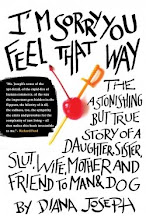2008/11/25
Denken um denken
2008/11/24
Brilliance
"The power of [writing] exercises depends on recognition of the value of teaching form, not 'expression.' I believe that unless and until reading and writing are taught together--and are taught together with discussion--there will be little chance that English departments will survive as anything but outposts of sociology. But teaching writing as a way of learning to read and reading closely as a model for careful writing is to guide students to the discovery of the powers of language: should that not be the chief mission of any and all English departments? . . . . Anyone we read with pleasure can help us to teach others to read with pleasure. If we do not aim for instruction and delight, those Horatian values will forever elude us."
(Ann E. Berthoff)
And this one, what brilliance:
"Read it as if it made sense and perhaps it will."
(I.A. Richards)
2008/11/22
Process IV
---
Some gems from the book Forming / Thinking / Writing: The Composing Imagination by Ann E. Berthoff.
"Having the capacity to understand means having the capacity to misunderstand."
"Language is not a set of pigeon holes into which we put things, ideas, feelings. We discover meanings in the process of working (and playing) with the means language provides."
"The aim of composing is not to tolerate chaos for its own sake but to learn to put up with it while you discover ways of emerging."
And a quote, by Mary Shelley, that the author uses: "Invention consists in the capacity of seizing on the capabilities of a subject and in the power of moulding and fashioning ideas suggested to it."
Syringes II, section 2
I use a lot of syringes. I've done the math. Out of curiosity.
I'll examine the package inserts when I need to.
---
It's these "Syringe" poems, actually multiple drafts of the same poem, that I have come back to. Five pieces spread across time: 03-21-06 to 12-04-07.
---
Needle or syringe? Needle is the pointed tube at one end. Syringe is the body cavity numbered for measurement of dosage. It is overall a poor, if not rudimentary imitation of an instrument perfected by nature. Mosquitos have them. Jellyfish have them. Pit vipers and cobras have them. Scorpions have them. Stonefish have them. The animal kingdom bears needles at every turn. Needles are wielded. Here, there are no dosing instructions or trademarks.
---
"Instructions for use:
1. Wash hands and gather supplies. To expose plunger, twist white cap to break seal, then pull off.
2. Wipe top of insulin bottle with a BD™ Alcohol Swab. If you are taking cloudy insulin, roll the bottle between your hands until it is uniformly cloudy. Never shake a bottle of insulin.
3. To expose needle, twist orange cap, then pull straight off, being careful not to bend the needle or let needle touch anything.
That is the interesting part. Steps four through eight are rather tedious, businesslike, accounting and number-management.
---
These poems obsessed over form and left nothing at stake. They feature missiles, phalluses, and a fog of abstraction. I thought about this poem again, this was on Thursday. All those silly revisions. Allow Syringes to become another form. [This is what Process told me.] It wants to take another form. [I nodded, it made sense.] Give to it another form. [Okay. I will.]
---
I imagine a gun that shoots syringes as ammunition. A belt-fed fully automatic gun that de-caps and fires syringes, needles-first. There is no turn. It always goes toward images of warfare and violence.
2008/11/21
Syringes II
The syringe body contains air: a sterile body when manufactured to that effect. Sterility. A syringe never contains nothing. It is impossible for a syringe to contain nothing. It must contain something.
---
I like to gaze at my books from time to time. Usually when I work. I pause to think or to reflect, and I gaze at my books. Many of them I have not read, not yet.
---
Pharmacies sell syringes by the box: "Insulin Syringes / with the BD Ultra-Fine™ needle / 100 sterile single use syringes (10 packs)". [I wonder why "single use" is not hyphenated.] This is and is not poetry. It is not poetry to me because syringes serve a utilitarian purpose. I use syringes to inject insulin into my body. My pancreas cannot make insulin for some reason I do not know and at which I shrug. Insulin syringes are the type commonly used by heroin addicts and methamphetamine junkies to inject those compounds intravenously. (This, the act of pushing a needletip through your skin into a bulging vein, could not seem any more unpleasant an act, even as an act of mere imagination. I shake my head and clench my face in disgust.) The box in which the syringes are packaged says nothing regarding the syringes' possible misuse at the hands of drug addicts. The box lid flap asks politely, "For safe disposal of insulin syringes, please see package insert."
2008/11/18
Process III
Is this "deconstruction" or is it simple, old-fashioned imagination? How would we like to hone our sense of words to a fine edge capable of severing nerves and tendons? Has anyone ever seen that stupid TV show on Spike wherein absurd theories are tested for the benefit of a male audience? Does it really take an ample demonstration to prove that silicon breast implants don't float whereas breasts do? All you need is an imagination though some encouragement helps.
What can you read over and over again?
Martin Amis' Time's Arrow and Einstein's Monsters.
Padgett Powell's short stories (most of them but not all of them).
G.K. Chesterton's Orthodoxy.
Some things I have never heard but would like to hear before I leave college forever
"I agree with you completely. T.S. Eliot was a goddamn lunatic for writing that nonsense."
"We in the administration value you as a student, not just as a dollar-figure."
"Please put your pants back on."
"Yes, your student health insurance will cover that."
"We don't know how they escaped. But you'll need tomato sauce, believe us."
"The university has decided to play 'opposite fiscal year.' This year the English department gets the athletic department's budget, and the athletic department gets the English department's budget."
2008/11/13
Process II
(The rest is not from Joy Williams stories.)
(!) He made a throne. His friend said it was supposed to be uncomfortable. They argued. They cited historical examples. (!) He wanted to be a brigand when he grew up. (!) Point of order. Restraint! Restraint! Handcuffs!
--------
Dare, chance, gamble, risk. . . . . How do we ARC? What is arc? Trajectory? Something -- someone -- must set an arc/trajectory in motion. Up & away OR down & away. What sets trajectory moving backward? How would this happen/work: UNDERTRAJECTORY? . . . . fire into the ground? Digging? Underground. Diving? Underwater. Descending movement. Descending but moving forward. Underway. Unterweg. Back and forth? Hin und her? How much is hidden among what is shown? How much is presented and how much is overlooked?
--------
Considered thus far or soon-to-be considered:
Process.
Revision.
Rewrite.
Heart.
Spine.
Truth.
Tension.
Arc.
Trajectory.
Pace: of narrative, of writing.
Pace: of emotion, of logic.
Can we know the process of another?
Limits.
Limitations.
Update (11/18/08):
I apologize for this post. It makes no sense. I don't know what I was thinking but I wrote it during a class. That was wrong of me. Perhaps I was distracted or off fighting evil in another universe. I don't rightly remember. Sorry.
No, I take it back. Some of it makes sense, with tweaking:
He made a throne. The throne was made of scrap lumber and carpet samples. His friend said it was supposed to be uncomfortable. "It's plenty uncomfortable," he said. They argued. They cited historical examples. The friend said, "Genghis Khan rode a horse all day. That gets uncomfortable." His rebuttal was, "This isn't a horse. What the hell are you talking about?" The friend stared at him in disbelief that they were arguing about this in the first place. Then the friend said, "I can't believe you made a throne. You're no king. How presumptious." He said, "Get the hell out of my garage."
2008/11/10
Close-Read Tension
Something for later. An unknown at death. A will. A snack to preempt hunger. An extra $20 from the ATM. Something for later.
Tension. We understand 1st drafts (garbage). We understand revision. The question now becomes How do we create and effect tension among characters and reader? The nuances have yet been lost on me. Certainly tension works differently in every story. What is the tension-organ? Nerves?
[Not that one, this one.] With tension the comfortable are disturbed. (With truth the disturbed are comforted.) I have never murdered a characer. I have never characterized a murder. I don’t think especially about killing. To kill would change a story, its dynamics. Imagine the effect of killing a character, of murdering a character mid-story. That would create tension. [Tension with a subtle-B.]
If I know where I’m going when I set out, then I’m not lost; I’m on vacation.
A tunnel in the sand. An overwhelming selection of pens. Discarded helmets. Why are there golf clubs in the storage freezer? Night of the toads. A police cruiser, an ambulance, and a fire truck at a suburban house at the climax of rush-hour, a case of domestic violence, spousal abuse, jealousy, all of it seen through the front window and reported by many dozens of motorists.
2008/11/08
Hidden Heart
This story I wrote almost two years ago has been evading me. Today I captured it's hidden heart. Or at least a ventricle, perhaps an aorta. But I would guess that about 75% of the story was a narcissistic celebration of youthful whining. The 25% that wasn't all about me showed enormous potential. And yet again the character with whom the heart of the story lies is a woman.
In many of the stories I write the focal character is female. I set this as a personal challenge a long time ago, to write a female perspective. I did, and then I wrote more. They keep coming back. They are more interesting than just about every male character I've written (a juvenile bunch of ne'er-do-wells, with the occasional highly isolated neurotic thrown in). The female characters have more personality too. They are more complex, more complicated, more vulnerable to every possible extreme I can imagine. They are also more resiliant. They seem in many ways more human. I wonder why this is. (No reason for me to think too much about it, or I'll just end up confusing myself.)
Perhaps through them I can say all the things that I cannot say through male characters. I don't know. This requires more process.
2008/11/04
The Spine and Cowardice
Process
This is an ongoing question.
"Ongoing" is self-contained. One cannot "ongo" and a group cannot "have ongone." Nor: he/she/it "onwent" but it "went on" for some time. Things happen; they "go on" every day.
"Fiction should comfort the disturbed and disturb the comfortable." -David Foster Wallace
Part of my process sums up as a lot of rolling around not writing much of anything, but holding the story on the edge of a knife: I don't think about the story too much but I think about it.
The process functions in fragmentary fits. There is no quota. There is no product. The process is ongoing. Everworking. Phenomenal. There is no blame. (Like SUBTLETY: it's not SUBTLE without a B.) When the pen is not in motion, the mind is. The eye is. The nose and ears. The tongue. The skin, the heart, the lungs, the entire nervous energy, the demand for food, the bursts of lust, the need to fuck, it's all the process.
I think I'd rather have my masculinity questioned than be called spineless. I could get by without my balls, but not without my spine.
Of course your characters will evade your attempts to invade their lives. You're God to them. They hate you for it. They're real. But they're not actual people. You won't hurt their feelings by writing out their secrets in detail for the whole world. It's only human to want to witness the misery and suffering of others, and be able to say, "I'm glad that's not me."
The process is very slow. This is because I don't know where the fuck I'm going.
2008/11/02
We Want to Live!
In other uninteresting news, I can't think of any. Except this: If you're the kind of person who gets lonely in the winter, go to Pet Expo and buy yourself a plastic container and a bag of bigass crickets. Crickets in winter.
A Slowly Growing List of Things to Look Forward To When You Have a Child
- Every day is either Christmas or Halloween or Birthday or Easter
- Leave those cats alone! They're going to scratch you and it will hurt
- You cannot lie under circumstances, but nor can you tell the literal truth
- Geez that kid is sharp
- Can I have cake? Can I have cake? Can I have cake? Huh? Daddy? Can I have cake?
- For the last time, stop asking me!
- Noticing the growth: taller and a bit heavier to carry
- Children's television shows
- Food. Wasted food
- Remembering that you once acted this way yourself
- Watching where the both of you are going
- The joy of hearing the word "fuck" being used experimentally, and justifying this experimentation by saying "Well they learn it eventually"
- TANTRUMS
- Sitting down together on the living room floor, a mess of blocks & cars & plush Care Bears strewn around you, discussing the complexities of each car's identity, its name, and why it is so humorous
- Having to take responsibility for someone else for a change
- More frustration than you're prepared for
- Wicked cackling
- Drawings of potato guys
- Learning about the world all over again
- Circular Logic
- Unexpected hugs and words put beautifully together out of context
- Waking up after 4 hours of sleep, and unexpectedly having to confront shit, in more than one place, including the carpet, a big toe, a butt, a bed, a toilet seat, and underpants



